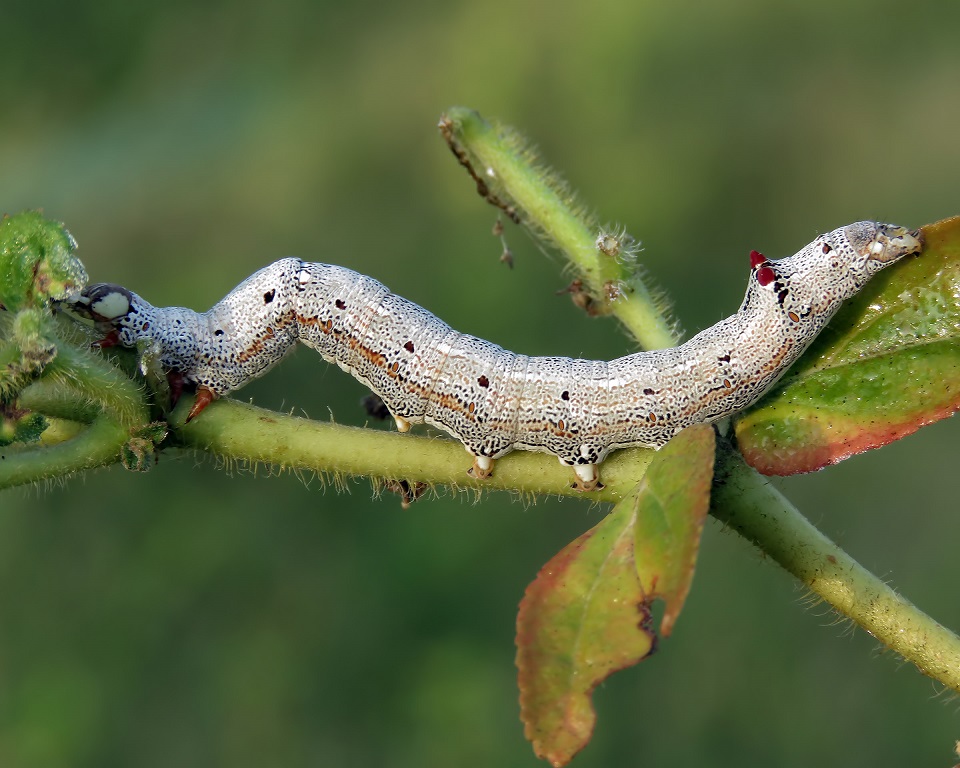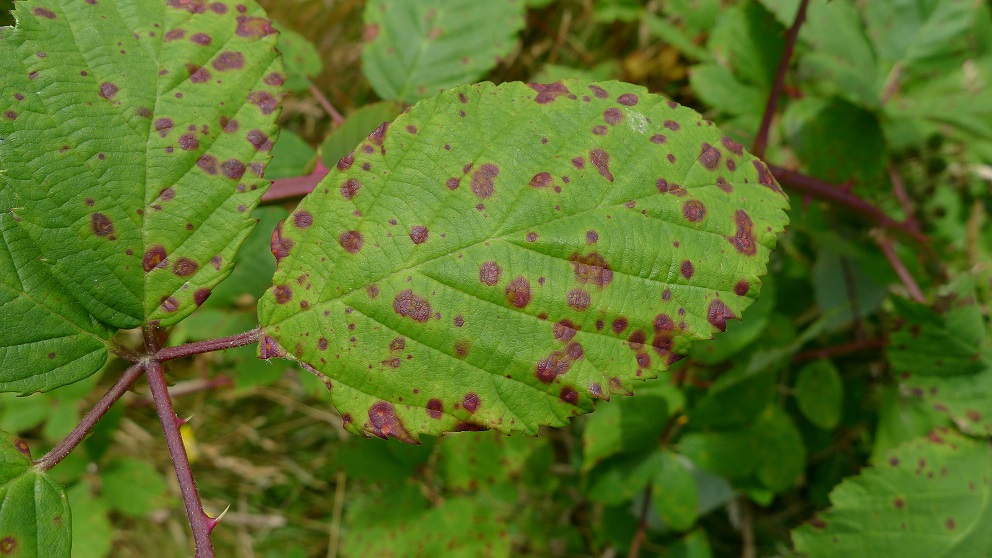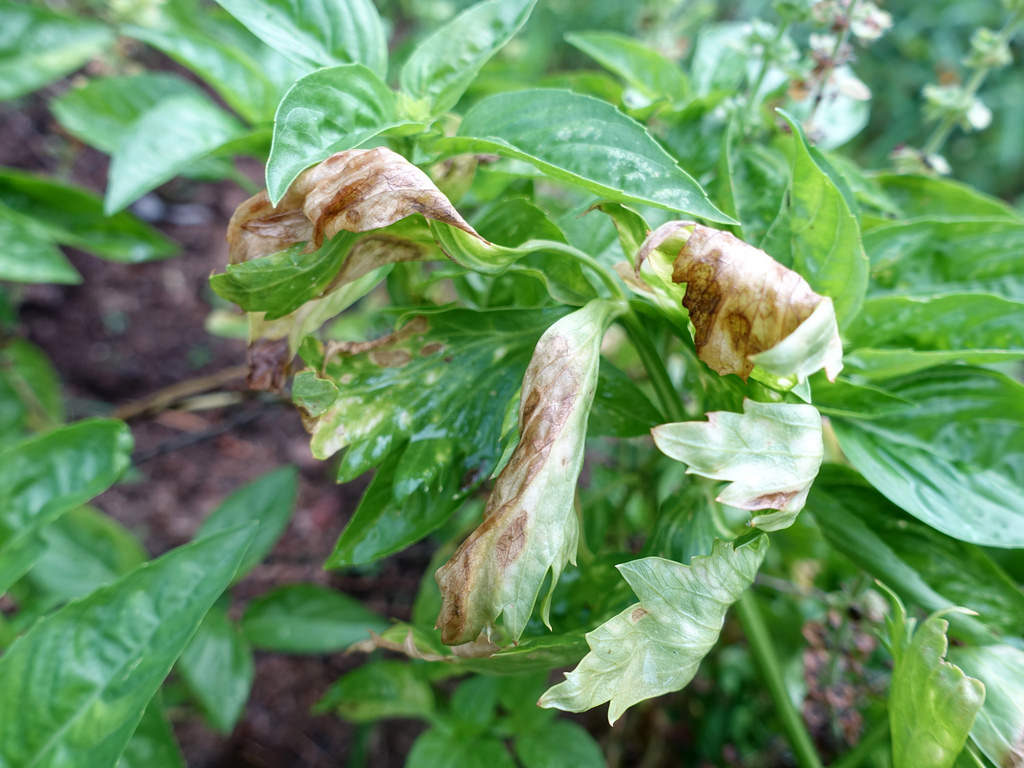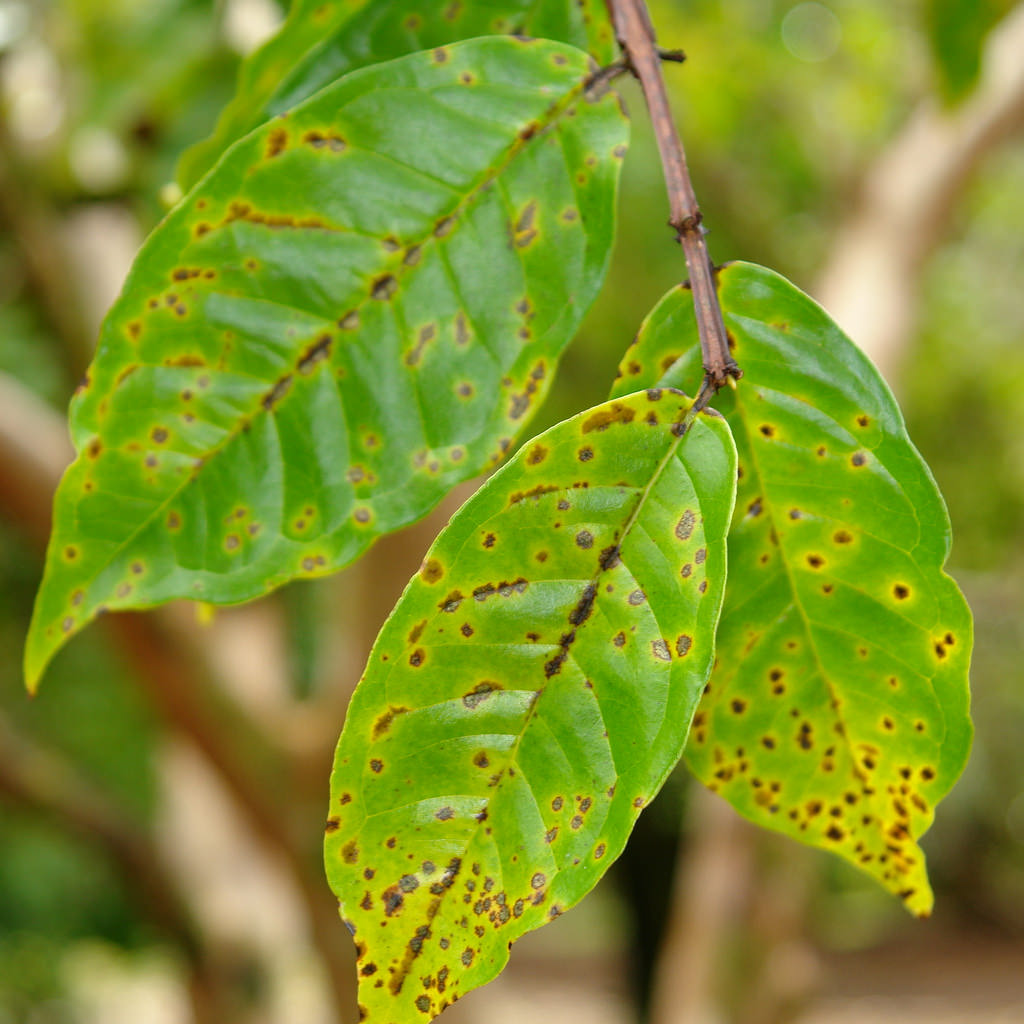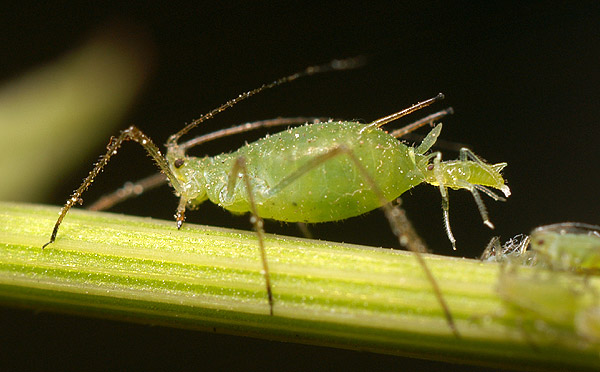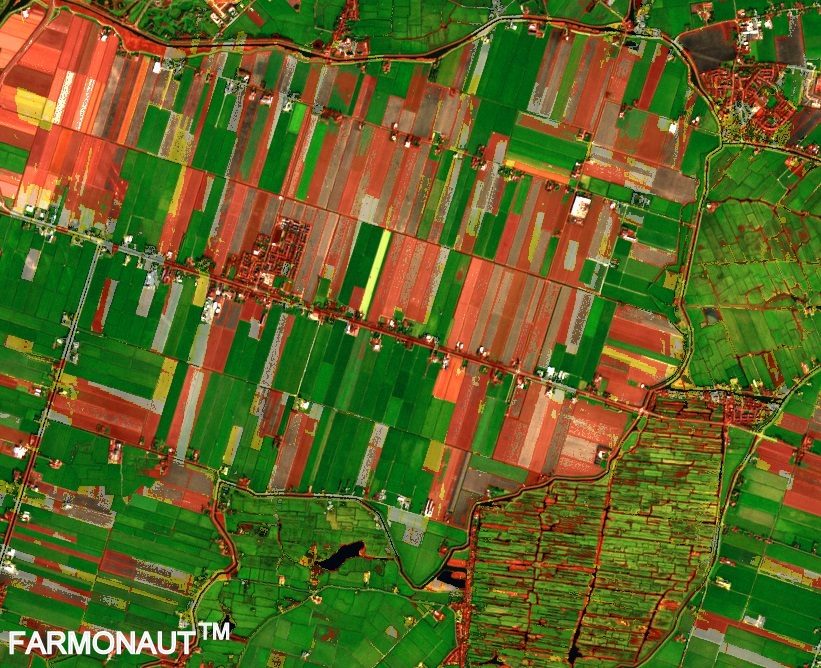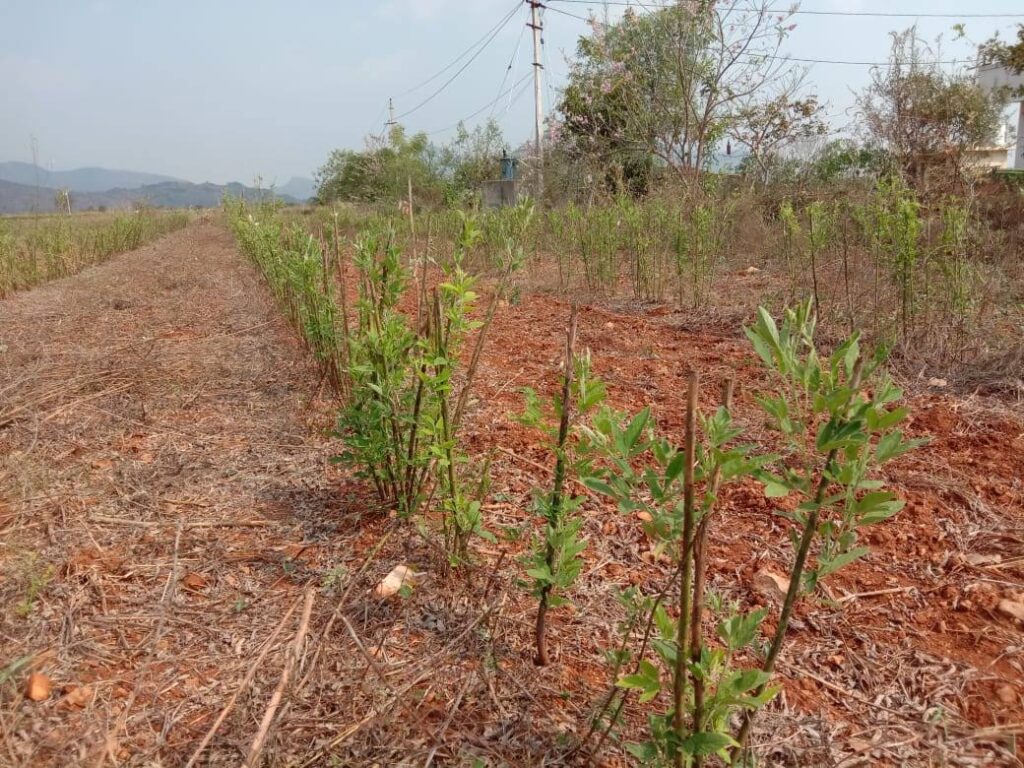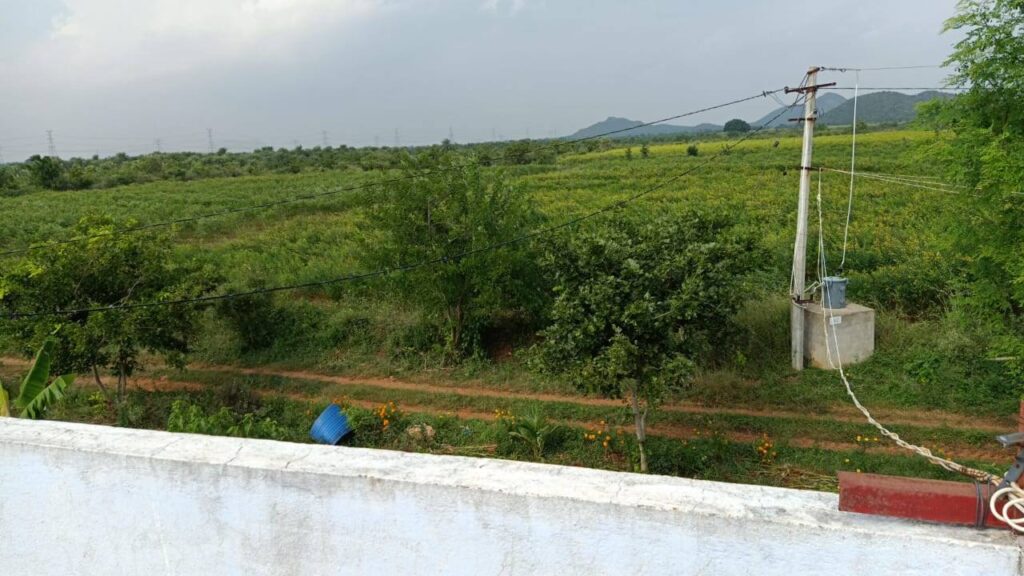Identifying and Controlling Black Bugs on Citrus Trees: A Comprehensive Guide
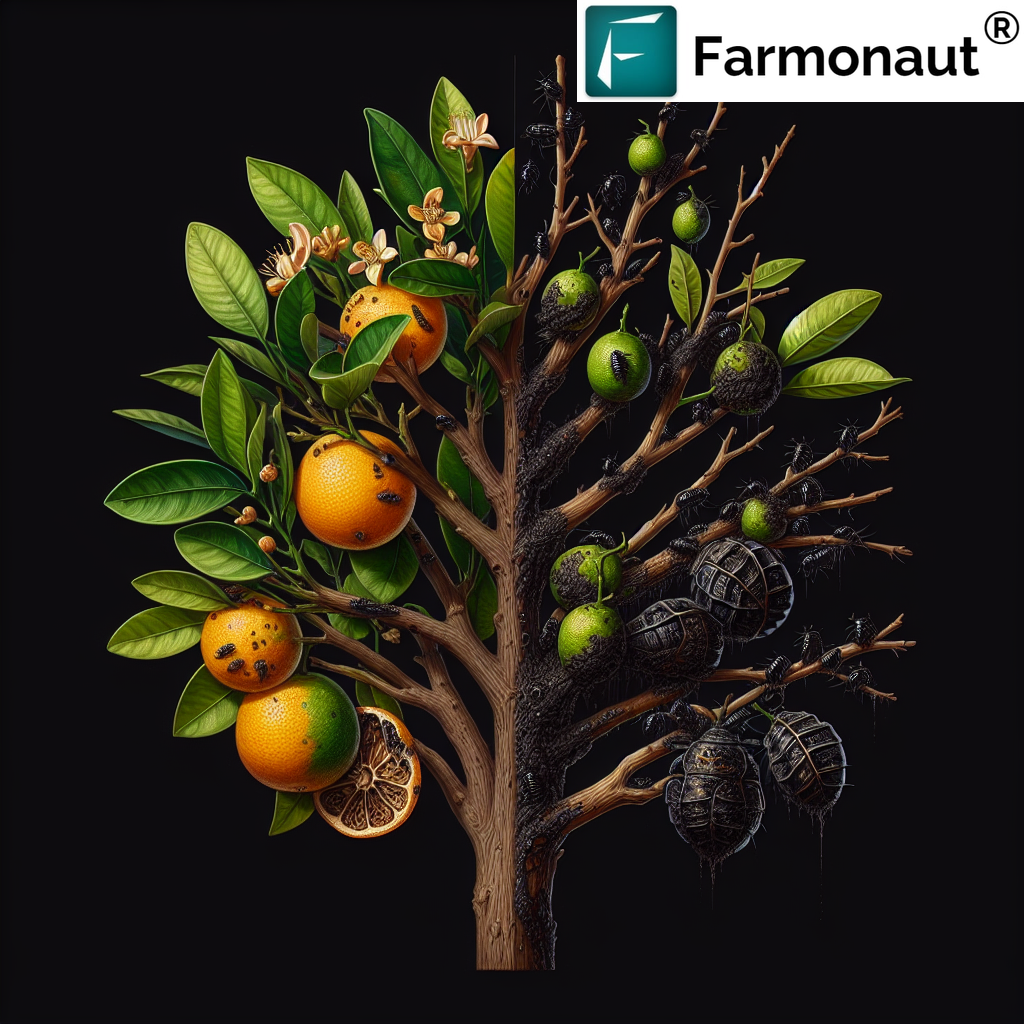
As citrus growers and enthusiasts, we understand the importance of maintaining healthy trees for optimal fruit production. One common challenge we face is the presence of black bugs on citrus trees. These pests can cause significant damage if left unchecked, making it crucial to identify and control them effectively. In this comprehensive guide, we’ll explore everything you need to know about black bugs on citrus trees, their impact, and how to manage them using both traditional methods and modern technologies like those offered by Farmonaut.
Table of Contents
- Understanding Black Bugs on Citrus Trees
- Common Types of Black Bugs Affecting Citrus
- Signs and Symptoms of Infestation
- Impact on Citrus Tree Health and Fruit Production
- Traditional Control Methods
- Integrated Pest Management (IPM) Strategies
- Leveraging Technology for Pest Management
- Farmonaut’s Role in Modern Citrus Farming
- Preventing Future Infestations
- FAQs
1. Understanding Black Bugs on Citrus Trees
When we talk about black bugs on citrus trees, we’re referring to a variety of insect pests that can infest and damage citrus plants. These pests are often small, dark-colored insects that feed on various parts of the tree, including leaves, stems, and fruits. Understanding their biology and behavior is crucial for effective management.
Why Black Bugs Are Attracted to Citrus Trees
- Rich nutrient source: Citrus trees provide ample food for these insects
- Favorable climate: Many citrus-growing regions have ideal conditions for pest proliferation
- Natural shelter: The dense foliage of citrus trees offers protection for these bugs
2. Common Types of Black Bugs Affecting Citrus
Several species of black bugs on citrus trees can cause problems for growers. Let’s explore some of the most common ones:
2.1 Citrus Black Flies (Aleurocanthus woglumi)
These small, dark-winged insects are a significant pest in many citrus-growing regions. They feed on the undersides of leaves, causing yellowing and reduced vigor in the tree.
2.2 Black Citrus Aphids (Toxoptera aurantii)
While not always black, these aphids can appear dark-colored and cluster on new growth, sucking sap and potentially transmitting diseases.
2.3 Citrus Root Weevils (Diaprepes abbreviatus)
The adult weevils are often black or dark gray and can cause significant damage to leaves, while their larvae attack the roots.
2.4 Black Scale Insects (Saissetia oleae)
These small, dome-shaped insects appear as black bumps on branches and leaves, feeding on plant sap and excreting honeydew.
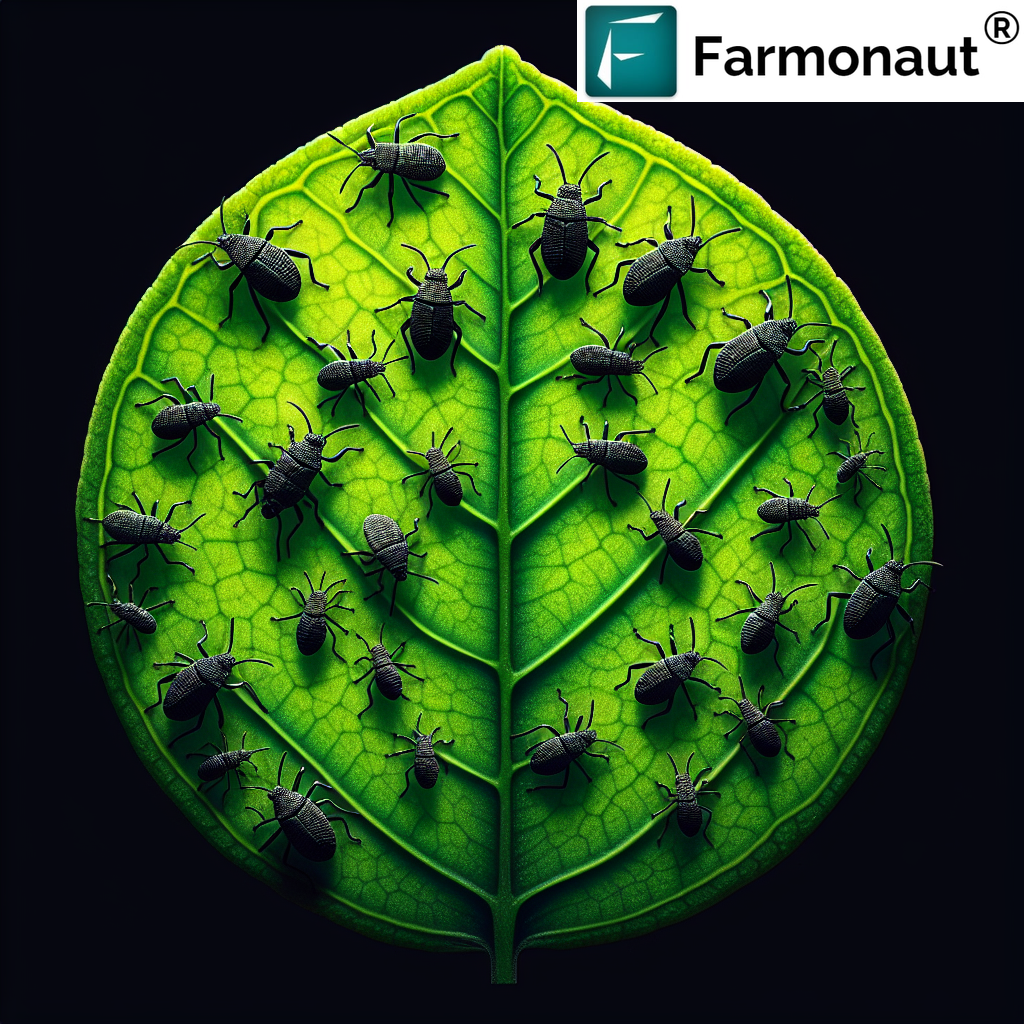
3. Signs and Symptoms of Infestation
Recognizing the signs of bugs on citrus trees early can help prevent severe damage. Here are some indicators to watch for:
- Discolored or yellowing leaves
- Sticky residue on leaves or fruits (honeydew)
- Sooty mold growth on leaves and branches
- Curling or distorted leaves
- Presence of small, black insects on the undersides of leaves or along stems
- Reduced fruit yield or quality
- Premature leaf drop
4. Impact on Citrus Tree Health and Fruit Production
The presence of black bugs on citrus trees can have severe consequences if left unchecked:
4.1 Reduced Photosynthesis
Infestations can lead to leaf damage and sooty mold growth, reducing the tree’s ability to photosynthesize effectively.
4.2 Stunted Growth
Severe infestations can stunt the growth of young trees and new shoots on mature trees.
4.3 Decreased Fruit Quality and Yield
Bugs feeding on fruits can cause blemishes, reduced size, and even premature fruit drop.
4.4 Increased Susceptibility to Diseases
Pest damage can create entry points for pathogens, making trees more vulnerable to diseases.
5. Traditional Control Methods
While modern technologies offer advanced solutions, traditional methods still play a crucial role in managing black bugs on citrus trees:
5.1 Cultural Controls
- Proper pruning to improve air circulation
- Maintaining tree health through proper nutrition and watering
- Removing and destroying infested plant parts
5.2 Mechanical Controls
- Physically removing visible bugs
- Using sticky traps to capture flying insects
- Pruning heavily infested branches
5.3 Biological Controls
- Introducing natural predators like ladybugs and lacewings
- Using parasitic wasps that target specific pests
- Applying beneficial nematodes for soil-dwelling pests
5.4 Chemical Controls
When other methods are insufficient, judicious use of pesticides may be necessary. Always follow label instructions and local regulations.
6. Integrated Pest Management (IPM) Strategies
An effective approach to managing black bugs on citrus trees involves implementing Integrated Pest Management (IPM) strategies. IPM combines various control methods to create a comprehensive and sustainable pest management plan.
6.1 Regular Monitoring
Conduct frequent inspections of your citrus trees to detect pest problems early. This can be done through visual checks and by using monitoring tools like sticky traps.
6.2 Establishing Action Thresholds
Determine the pest population levels at which control measures need to be implemented to prevent economic damage.
6.3 Prevention
Focus on creating an environment that is less favorable for pest development. This includes proper irrigation, fertilization, and sanitation practices.
6.4 Using Multiple Control Methods
Combine cultural, mechanical, biological, and chemical controls as needed, prioritizing the least harmful methods first.
6.5 Evaluating Results
Regularly assess the effectiveness of your pest management strategies and adjust as necessary.
7. Leveraging Technology for Pest Management
In the modern era of agriculture, technology plays a crucial role in managing pests like black bugs on citrus trees. Advanced tools and systems can significantly enhance our ability to detect, monitor, and control these pests efficiently.
7.1 Satellite-Based Monitoring
Satellite imagery can provide valuable insights into crop health and potential pest infestations across large areas. Farmonaut’s satellite-based crop health monitoring system offers real-time data on vegetation health, helping growers identify potential problem areas before they become severe.
7.2 AI-Powered Advisory Systems
Artificial Intelligence (AI) can analyze data from various sources to provide tailored pest management advice. Farmonaut’s Jeevn AI Advisory System delivers personalized insights and recommendations based on satellite data, weather forecasts, and expert knowledge.
7.3 Mobile Applications
Smartphone apps can provide growers with instant access to pest identification tools, treatment recommendations, and real-time data. Farmonaut offers mobile apps for both Android and iOS devices, allowing farmers to monitor their crops on the go.
7.4 Weather Forecasting and Pest Prediction
Advanced weather forecasting combined with pest biology models can predict potential outbreaks. Farmonaut’s weather API provides accurate, localized weather data that can be crucial for timing pest control measures effectively.
8. Farmonaut’s Role in Modern Citrus Farming
At Farmonaut, we’re committed to revolutionizing agriculture through advanced technology. Our suite of tools can significantly enhance your ability to manage black bugs on citrus trees and other pests effectively.
8.1 Satellite-Based Crop Health Monitoring
Our satellite imagery provides high-resolution data on crop health, allowing you to identify potential pest hotspots before they become visible to the naked eye. This early detection can be crucial in preventing severe infestations of black bugs on citrus trees.
8.2 AI-Driven Pest Management Advice
Our Jeevn AI system analyzes satellite data, weather patterns, and pest biology to provide personalized recommendations for pest control. This can help you time your interventions perfectly and choose the most effective control methods.
8.3 Real-Time Weather Data
Access to accurate, real-time weather data through our Weather API allows you to make informed decisions about pest control applications, ensuring optimal efficacy and minimizing environmental impact.
8.4 Mobile Accessibility
With our mobile apps, you can monitor your citrus groves from anywhere, receiving alerts and updates about potential pest issues as they arise.
8.5 Data-Driven Decision Making
By leveraging our comprehensive data analytics, you can make more informed decisions about pest management, optimizing your resource use and improving overall orchard health.
Farmonaut vs. Traditional Monitoring Methods
| Feature | Farmonaut Satellite System | Drone-Based Monitoring | IoT-Based Monitoring |
|---|---|---|---|
| Coverage Area | Large scale (entire farms/regions) | Medium scale (individual fields) | Small scale (specific points) |
| Data Frequency | Regular updates (as frequent as daily) | On-demand (requires manual flights) | Continuous (real-time data possible) |
| Cost-Effectiveness | High (no hardware required) | Medium (drone purchase and maintenance) | Low (multiple sensors needed) |
| Ease of Use | Very High (web and mobile app access) | Medium (requires piloting skills) | Medium (technical setup required) |
| Data Analysis | Advanced AI-powered analytics | Manual or semi-automated analysis | Automated but limited to sensor data |
| Weather Independence | High (can penetrate cloud cover) | Low (affected by weather conditions) | High (not affected by weather) |
To get started with Farmonaut and revolutionize your approach to managing black bugs on citrus trees, visit our application page or explore our API services for custom integrations.
9. Preventing Future Infestations
While effectively managing current infestations of black bugs on citrus trees is crucial, preventing future outbreaks is equally important. Here are some strategies to help keep your citrus trees healthy and pest-free:
9.1 Maintain Tree Health
- Ensure proper nutrition through regular soil testing and appropriate fertilization
- Water trees adequately, avoiding both over and under-watering
- Prune regularly to improve air circulation and remove potential pest habitats
9.2 Practice Good Orchard Hygiene
- Remove fallen leaves, fruits, and other debris that can harbor pests
- Clean tools and equipment to prevent spreading pests between trees
- Quarantine new plants before introducing them to your orchard
9.3 Encourage Beneficial Insects
- Plant flowers and herbs that attract natural predators of citrus pests
- Avoid broad-spectrum pesticides that can harm beneficial insects
- Consider releasing beneficial insects as part of your IPM strategy
9.4 Implement Barrier Methods
- Use reflective mulches to deter flying insects
- Install physical barriers like tree wraps to prevent pests from accessing the trunk
- Consider using insect-proof netting for small trees or high-value cultivars
9.5 Stay Informed and Vigilant
- Keep up-to-date with local pest alerts and advisories
- Regularly inspect your trees for early signs of pest activity
- Participate in community pest management programs if available
9.6 Leverage Technology for Early Detection
Utilize Farmonaut’s advanced satellite monitoring and AI-driven advisory systems to detect potential pest issues before they become visible. Early intervention can prevent minor infestations from becoming major problems.
FAQs
Q1: How often should I inspect my citrus trees for black bugs?
A1: We recommend inspecting your citrus trees at least once a week during the growing season. More frequent checks may be necessary during peak pest seasons or if you’ve had previous infestations.
Q2: Are all black bugs on citrus trees harmful?
A2: Not all black insects on citrus trees are pests. Some may be beneficial predators. It’s important to correctly identify the species before taking action. Farmonaut’s AI system can help with pest identification.
Q3: Can organic methods effectively control black bugs on citrus trees?
A3: Yes, many organic methods can be effective, especially when used as part of an integrated pest management strategy. These include biological controls, organic pesticides, and cultural practices.
Q4: How does Farmonaut’s satellite monitoring detect pest infestations?
A4: Farmonaut’s satellite technology detects changes in vegetation health that may indicate pest activity. Our AI system analyzes this data along with other factors to identify potential infestations before they become severe.
Q5: Can weather conditions affect black bug infestations on citrus trees?
A5: Yes, weather conditions can significantly impact pest populations. Warm, humid conditions often favor pest development. Farmonaut’s weather API provides accurate forecasts to help you anticipate and prepare for potential pest issues.
Q6: How can I get started with Farmonaut for my citrus orchard?
A6: You can start by visiting our application page to sign up for our services. We offer various packages tailored to different farm sizes and needs.
Q7: Is Farmonaut’s technology suitable for small-scale citrus growers?
A7: Absolutely! Our services are designed to be scalable and accessible to growers of all sizes. We offer affordable packages that can benefit even small citrus orchards.
Q8: How does Farmonaut’s system compare to traditional scouting methods?
A8: While traditional scouting is still valuable, Farmonaut’s satellite and AI technology can cover larger areas more frequently and detect issues that may not be visible to the naked eye. It complements and enhances traditional methods.
Q9: Can Farmonaut’s system help with other aspects of citrus farming besides pest management?
A9: Yes, our technology provides insights into various aspects of crop health, including water stress, nutrient deficiencies, and overall plant vigor. This comprehensive approach can help improve overall orchard management.
Q10: How often is Farmonaut’s satellite data updated?
A10: Our satellite data is updated regularly, with options for daily updates in some regions. The frequency can be customized based on your specific needs and subscription level.
Managing black bugs on citrus trees requires a comprehensive approach combining traditional methods with modern technology. By staying vigilant, implementing integrated pest management strategies, and leveraging advanced tools like those offered by Farmonaut, we can effectively protect our citrus orchards and ensure healthy, productive trees.
Ready to take your citrus pest management to the next level? Subscribe to Farmonaut’s services today:
By embracing these advanced technologies and best practices, we can ensure the health and productivity of our citrus trees for years to come. Remember, effective management of black bugs on citrus trees is not just about addressing current infestations, but also about implementing long-term strategies for prevention and early detection.


